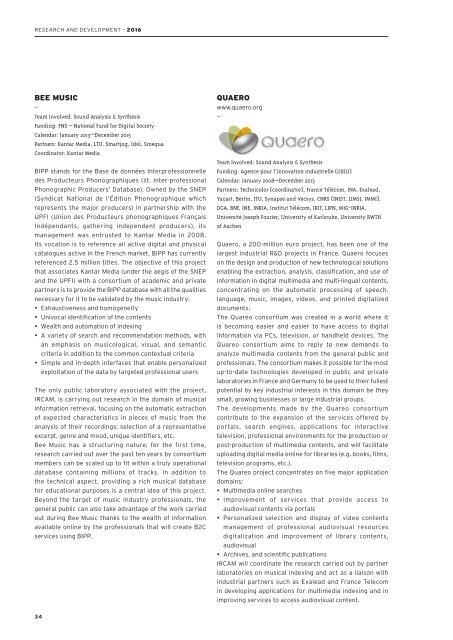technologies
brochure_R_D_EN
brochure_R_D_EN
You also want an ePaper? Increase the reach of your titles
YUMPU automatically turns print PDFs into web optimized ePapers that Google loves.
esearch and development – 2016<br />
Bee Music<br />
—<br />
Team Involved: Sound Analysis & Synthesis<br />
Funding: FNS – National Fund for Digital Society<br />
Calendar: January 2013—December 2015<br />
Partners: Kantar Media, LTU, Smartjog, Idol, Sinequa<br />
Coordinator: Kantar Media<br />
BIPP stands for the Base de données Interprofessionnelle<br />
des Producteurs Phonographiques (lit. Inter-professional<br />
Phonographic Producers’ Database). Owned by the SNEP<br />
(Syndicat National de l’Édition Phonographique which<br />
represents the major producers) in partnership with the<br />
UPFI (Union des Producteurs phonographiques Français<br />
Indépendants, gathering independent producers), its<br />
management was entrusted to Kantar Media in 2008.<br />
Its vocation is to reference all active digital and physical<br />
catalogues active in the French market. BIPP has currently<br />
referenced 2.5 million titles. The objective of this project<br />
that associates Kantar Media (under the aegis of the SNEP<br />
and the UPFI) with a consortium of academic and private<br />
partners is to provide the BIPP database with all the qualities<br />
necessary for it to be validated by the music industry:<br />
• Exhaustiveness and homogeneity<br />
• Univocal identification of the contents<br />
• Wealth and automation of indexing<br />
• A variety of search and recommendation methods, with<br />
an emphasis on musicological, visual, and semantic<br />
criteria in addition to the common contextual criteria<br />
• Simple and in-depth interfaces that enable personalized<br />
exploitation of the data by targeted professional users<br />
The only public laboratory associated with the project,<br />
IRCAM, is carrying out research in the domain of musical<br />
information retrieval, focusing on the automatic extraction<br />
of expected characteristics in pieces of music from the<br />
analysis of their recordings: selection of a representative<br />
excerpt, genre and mood, unique identifiers, etc.<br />
Bee Music has a structuring nature; for the first time,<br />
research carried out over the past ten years by consortium<br />
members can be scaled up to fit within a truly operational<br />
database containing millions of tracks. In addition to<br />
the technical aspect, providing a rich musical database<br />
for educational purposes is a central idea of this project.<br />
Beyond the target of music industry professionals, the<br />
general public can also take advantage of the work carried<br />
out during Bee Music thanks to the wealth of information<br />
available online by the professionals that will create B2C<br />
services using BIPP.<br />
QUAERO<br />
www.quaero.org<br />
—<br />
Team Involved: Sound Analysis & Synthesis<br />
Funding: Agence pour l’innovation industrielle (OSEO)<br />
Calendar: January 2008—December 2013<br />
Partners: Technicolor (coordinator), France Télécom, INA, Exalead,<br />
Yacast, Bertin, ITU, Synapse and Vecsys, CNRS (INIST, LIMSI, IMMI),<br />
DGA, BNF, INE, INRIA, Institut Télécom, IRIT, LIPN, MIG-INRIA,<br />
Université Joseph Fourier, University of Karlsruhe, University RWTH<br />
of Aachen<br />
Quaero, a 200-million euro project, has been one of the<br />
largest industrial R&D projects in France. Quaero focuses<br />
on the design and production of new technological solutions<br />
enabling the extraction, analysis, classification, and use of<br />
information in digital multimedia and multi-lingual contents,<br />
concentrating on the automatic processing of speech,<br />
language, music, images, videos, and printed digitalized<br />
documents.<br />
The Quareo consortium was created in a world where it<br />
is becoming easier and easier to have access to digital<br />
information via PCs, television, or handheld devices. The<br />
Quareo consortium aims to reply to new demands to<br />
analyze multimedia contents from the general public and<br />
professionals. The consortium makes it possible for the most<br />
up-to-date <strong>technologies</strong> developed in public and private<br />
laboratories in France and Germany to be used to their fullest<br />
potential by key industrial interests in this domain be they<br />
small, growing businesses or large industrial groups.<br />
The developments made by the Quareo consortium<br />
contribute to the expansion of the services offered by<br />
portals, search engines, applications for interactive<br />
television, professional environments for the production or<br />
post-production of multimedia contents, and will facilitate<br />
uploading digital media online for libraries (e.g. books, films,<br />
television programs, etc.).<br />
The Quareo project concentrates on five major application<br />
domains:<br />
• Multimedia online searches<br />
• Improvement of services that provide access to<br />
audiovisual contents via portals<br />
• Personalized selection and display of video contents<br />
management of professional audiovisual resources<br />
digitalization and improvement of library contents,<br />
audiovisual<br />
• Archives, and scientific publications<br />
IRCAM will coordinate the research carried out by partner<br />
laboratories on musical indexing and act as a liaison with<br />
industrial partners such as Exalead and France Telecom<br />
in developing applications for multimedia indexing and in<br />
improving services to access audiovisual content.<br />
34


